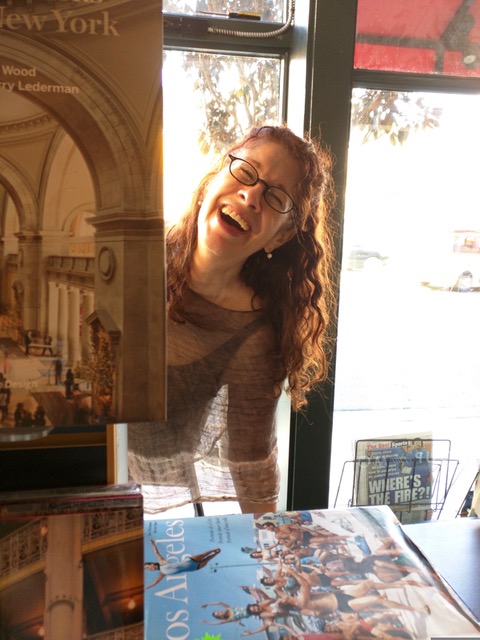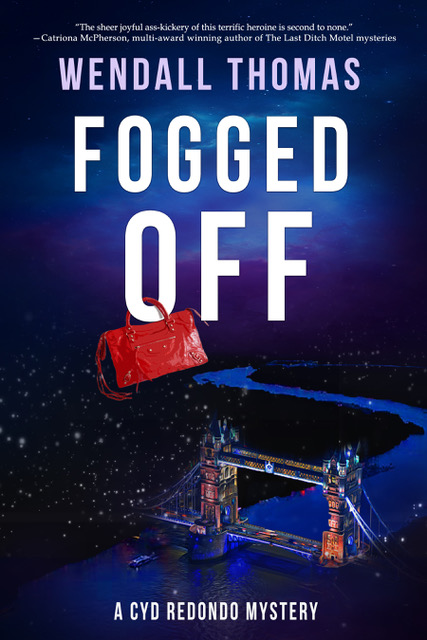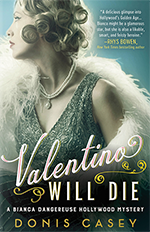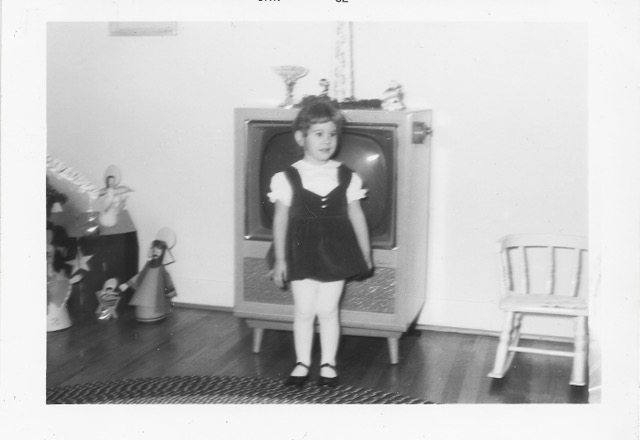
It’s time for another entry in my monthly series of author essays called Tell Me Your Story, where I invite successful authors to share their life experiences and how those experiences have influenced their writing. This month I am beyond thrilled to host the ever-so-lovely Wendall Thomas, whose wonderful, witty, Cyd Redondo Mysteries knocked my socks off from the get-go.
Wendall’s brave and honest story will resonate with anyone who grew up with a difficult parent. Sometimes you have to do whatever it takes to remove yourself from a toxic situation. And you may find that once you do, it will change your life.
Wendall teaches in the Graduate Film School at UCLA, lectures internationally on screenwriting, and has worked as an entertainment reporter, development executive, script consultant, and film and television writer. Her first Cyd Redondo novel, Lost Luggage, was nominated for the Lefty and Macavity Awards for Best Debut Mystery of 2017. Her second, Drowned Under, has been nominated for a Lefty for Best Humorous Mystery of 2019 and an Anthony Award for Best Paperback Original. Her short fiction appears in the crime anthologies Ladies Night (2015), Last Resort (2017), and the Anthony nominated Murder-A-Go-Go’s (2019).

Her latest Cyd Redondo, Fogged Off, will drop on November 2. Preorder now on Amazon. Catriona McPherson, multi-award winning author of The Last Ditch Motel mysteries, has this to say about Fogged Off: “The setting is old London Town, but the story is Wendall Thomas’s trademark three-ring circus, with the redoubtable Cyd Redondo as ringmaster, high-wire walker, and—of course—animal wrangler. What a joy it is to follow the increasingly bonkers plot knowing that every last madcap thread is guaranteed to come together in the end. Fogged Off is what the world needs right now.”
Wendall’s website address is http://www.wendallthomas.com
You can find her on Twitter at https://twitter.com/EWendallThomas
Copperheads
by Wendall Thomas
I grew up in North Carolina, land of hush puppies and copperheads.
When I was four years old, I was playing with my Barbie on the floor of our screened-in porch. My baby brother lay on a blanket a few feet away. Out of the corner of my eye, I saw something move.
It was a snake, headed straight for him. I ran to the door of the kitchen, yelling “Mom! Snake!”
My mother came to the door with a spatula in her hand. She looked out, saw the snake, slammed the door, and locked it.
I still hear that click. When I’m not working on my mystery series, I work on a novel that starts with a chapter called “Barbie vs. Snake.” It may be my best work. It may just be therapy. Time will tell.
You don’t need a narcissistic parent to feel rotten about yourself, but it certainly helps. I grew up obeying every rule, making straight As, never drinking or smoking, going to church three times a week, and trying to avoid any possible missteps. It was never enough to unlock that door. My mother complained about my “attitude,” my outfits, my taste in music. When she saw my report cards, she said more than once “I guess you’re lucky it’s better to be smart than pretty.”
Once I was in my teens, I was not totally blameless in this destructive mother/daughter dynamic. The more my mother undermined me, the more I did everything I could not to be her. I stopped going to church, started living in shredded overalls, and took a starring role in what she considered the blasphemous Godspell. This did not improve our relationship. If it hadn’t been for my Dad, I might never have survived those years. He bought me my first guitar and when I got my first “gig” singing at a pizza joint, my mother told me I was going to hell. He came and ran the soundboard.
Of course, most teenaged girls have issues with their mother. Most get past it. I couldn’t seem to. My mother’s fog of disapproval followed me to college. I was offered an “Honors” track at UNC and turned it down, too afraid I’d be found out as not smart enough. And in the years following, even though I was very lucky in my jobs and my friends, I always felt like an axe was about to fall.
After graduate school, I headed to Los Angeles, as far as I could get from home, and had a series of, at first horrible, but later, great jobs in the movie business. I managed to get an agent with my first script. It even got optioned. But I sabotaged myself with the next one, taking too long to write it and second-guessing myself and my agent at every step. I turned down a few jobs I should have taken, out of fear. I started therapy, but no matter how hard I worked and how well I did, I always felt dread about what was coming.
I still called my mother once a week, came back home when she had health issues, religiously sent birthday and Christmas presents—which she always returned or exchanged. In October 2001, she told me that if I flew to Europe for a job after 9/11, I deserved to die.
I met my husband on that trip. He’s the one who noticed my distress after every phone call to my mother, the tailspins they provoked. He supported me when I decided I would finally try writing a novel. By some miracle (and thanks to Nanowrimo, which made me write so fast I couldn’t second-guess myself), I finished it. Just as I was about to send Lost Luggage off to agents, my mother called. She said she’d been thinking and needed to talk to me about something.
This is what she said: “Your whole life is a failure. And the reason you’re a failure, and why it’s a waste of time, all this writing, is that you’re not baptized by the Holy Spirit. You deserve to fail and you always will.” It wasn’t the Holy Spirit thing that made me go cold, that shut something down inside me—I knew she was serious about her faith and genuinely wanted her children to share it—it was the rest.
When I told my husband about the conversation, after he calmed down, he said I should never speak to my mother again and made me promise to think about it. I sought out books and found she had about ninety per cent of the markers for an Extreme Narcissistic Personality disorder. The books said, especially for daughters, sometimes the only way to change the dynamic was “no contact.”
It was very hard at first, even to contemplate such a move. I felt guilty, I felt angry, but mostly I felt nauseaus. Most of the people who know and love me well, including my father, begged for me to cut the cord, for my own sake. But there were friends and family members who judged me for even considering it. Some of you reading this may as well. I understand why.
But I did it. I stopped calling. I haven’t spoken to my mother in six years.
Within weeks of that decision, it was like a light came on. A series of doors that had seemed closed, opened. I sold my book and was astounded and honored that it was nominated for awards. I got a long-term contract for international lectures, I had short stories accepted, I was promoted at UCLA, I was able to write a second book in a quarter of the time it took to write the first one. But the realization that I couldn’t be a writer and have a mother at the same time was still an excruciating one.
My mother is not a monster. She’s the same amalgamation of traumas and triumphs and decisions that we all are. After she locked the kitchen door, she went to get our next door neighbor for help. She’s enormously generous to strangers. She visits people in nursing homes, gives to her church, helps out drug addicts who want to come to Jesus. In that moment, on the porch, I’m sure she was just terrified.
I still love her and only wish her well. It has been much easier to forgive her and feel compassion for her when I’m not ripping the scab off every week. And as time goes on, I feel less guilty myself. I believe if my mother were really devastated by my absence, she would have called me more than once in all this time, but she hasn’t.
At the time, that clicking lock felt like I was all alone, that I wasn’t worth saving. When I look back now, maybe the message in that gesture was really “save yourself.” I’m 62 years old and I have a lot of books I want to write. With any luck, good books. I just couldn’t do it with a copperhead on the porch.




October 20th, 2021
Wow. Just wow. Thank you, Wendall, for sharing your story. Narcissism is so difficult because it can be crazy-making, with what amounts to gas-lighting. You can end up wondering if you’re crazy for the way you’re feeling. Congratulations on stepping away and taking care of yourself. I want to meet you. 🙂
October 20th, 2021
That’s so kind of you to say. Thank you so much. Love to meet you, too.
January 10th, 2023
You told your story very well—even though it was painful, I wanted to read until the end. I like it that you tried to be fair to your mother. Still she was very toxic to you. Best wishes for your continued success.
January 13th, 2023
Thank you for telling your story, Wendall. Like you, I had major issues with both my parents. It is so hard for a child to realize that parents are not always deserving of love or continued communication. Sometimes the relationship isn’t that simple and a balancing act is required. You did the right thing!